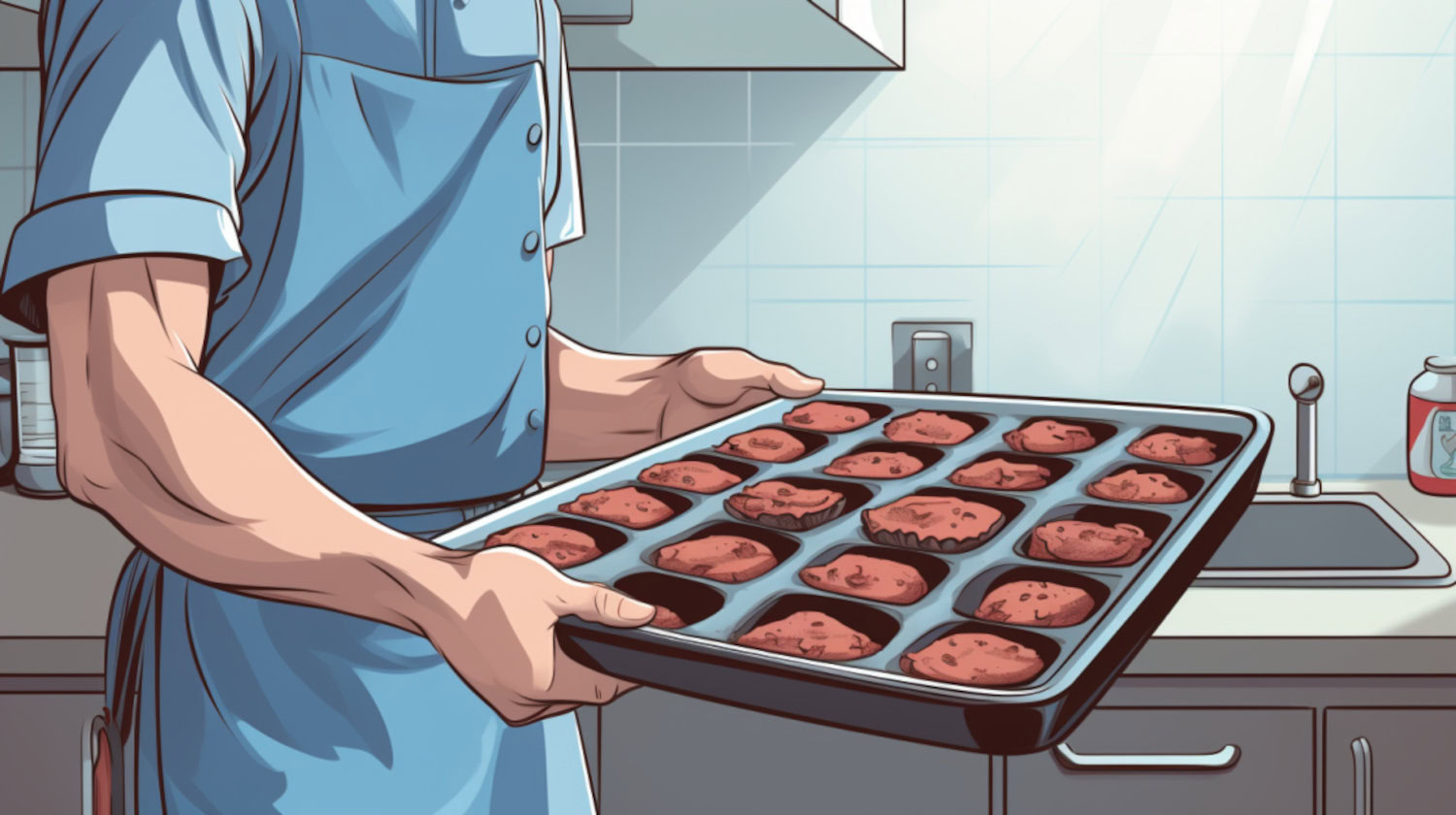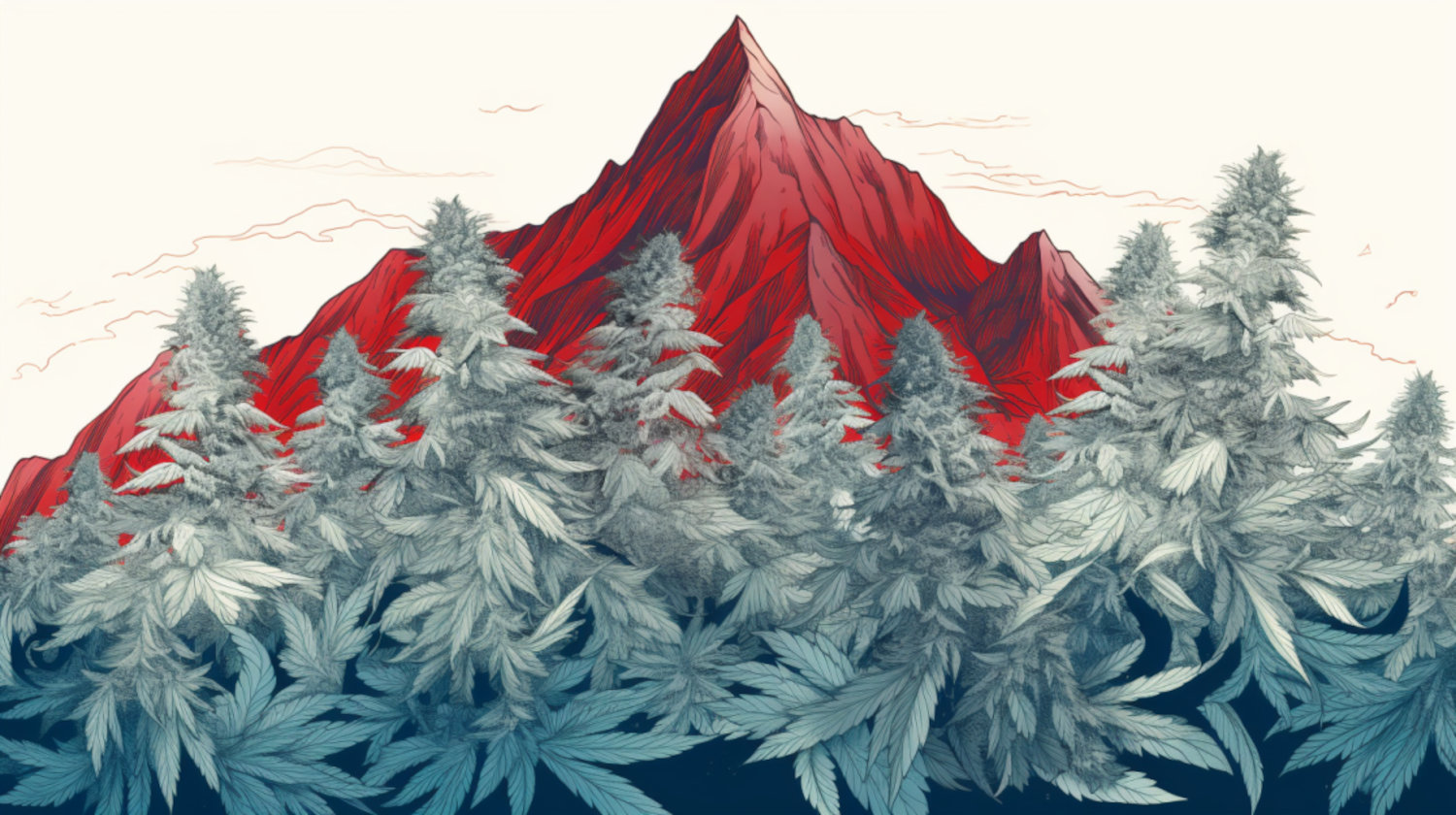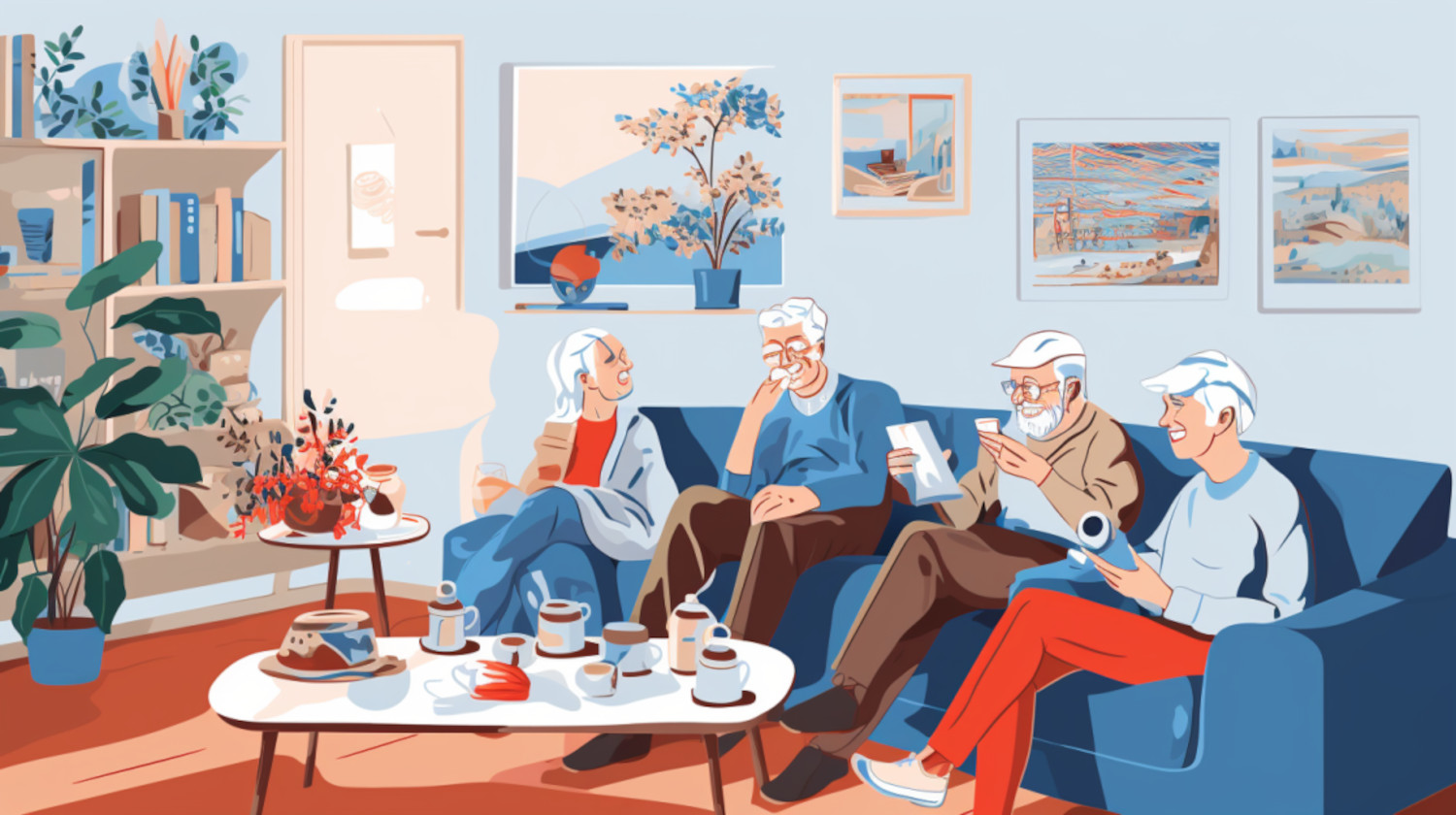In This Article
- Can You Overdose on THC Gummies and Other Edibles?
- What Are the Signs or Symptoms of an Edible Overdose?
- How Many Edibles is Too Many?
- I Accidentally Ate 50 mg of Edibles / I Accidentally Ate a 100mg Edible. What Should I Do?
- Can Edibles Kill You?
- How Do I Minimize the Risk of Overdosing on Edibles?
- When Should I See a Doctor?
- References
Nowadays, getting a dose of immune system enhancement is quite literally a piece of cake. In an ever-growing buffet of cannabis products, edibles stand out as one of the most convenient, discreet, and delicious ways of stimulating the endocannabinoid system (ECS).
Available in most licensed dispensaries, cannabis edibles come in many shapes, sizes, flavors, potencies, and cannabinoid ratios, allowing consumers to sink their teeth into their favorite strains without smoking, vaping, or dabbing.
Edibles are devouring a large slice of the cannabis industry, with the global market generating revenue of $9.68 billion in 2023. As consumer appetite grows, analysts foresee the cannabis edibles market reaching $20.60 billion by 2028.
Can you eat too many edibles at once, though?
Many of us have been there: eating too many edibles in anticipation of the plant's remedial effects, only to find ourselves seeking relief from the thing we were meant to gain relief from!
But since cannabis is still considered a federally illegal narcotic with intoxicating properties, many consumers may wonder, "Can you overdose on edibles?"
Can You Overdose on THC Gummies and Other Edibles?
Overdose (OD) occurs when a drug bombards the body and disrupts normal bodily functions. Of all drug-related overdoses in the U.S., opioid overdose is the most prevalent. Cannabis is emerging as a substitute for opioids, with rates of opioid prescriptions declining in states with legal cannabis programs. Nonetheless, every drug — regardless of its purpose and source, e.g., legal market or black market — can cause overdose, some of which can be fatal and others non-fatal.
“There have been no reported deaths from natural cannabinoids. However, taking an overdose of THC may cause negative symptoms like nausea, vomiting, paranoia, and in severe cases, hallucinations," said Dr. Brian Kessler, whose opinion is in line with the Center for Disease Control and Prevention (CDC). CDC officials claim that a cannabis overdose is unlikely.
While many cannabis overdose symptoms may pose a safety risk to yourself and others, others may be less severe. Although the symptoms may sometimes feel similar to those associated with a typical drug overdose, they usually ease off without medical intervention.
That said, even though you can OD on edibles and recover quickly, it's important to know your limits.
In 2017, an in-depth examination of cannabis' apparent health risks was published by the National Academies of Sciences, Engineering and Medicine. It highlighted the risks of fatal and nonfatal overdoses. Authors noted that a handful of children slipped into comas and stopped breathing after accidentally consuming adult-use cannabis. On top of this, the association attributed the death of one teenager to edible cannabis product ingestion.
“Some people who use marijuana can feel some very uncomfortable side effects, especially when using marijuana products with high THC levels. People have reported symptoms such as anxiety and paranoia. In rare cases, an extreme psychotic reaction (which can include delusions and hallucinations) can lead them to seek treatment in an emergency room," adds Dr. Kessler.
Collectively, this information tells us that you can overdose on edibles and experience adverse effects. So, does this mean that you can overdose on THC gummies, too? The answer is "yes." If it contains THC and you don't consume it responsibly, there's always a chance of overdoing it. However, fatal overdose is highly unlikely, as one has never been documented.

What Are the Signs or Symptoms of an Edible Overdose?
“Ingesting too much THC can cause someone to experience symptoms like nausea, vomiting, anxiety, increased blood pressure and heart rate, paranoia, and, in some cases, hallucinations. If you think you took too much THC, stay hydrated and consult a doctor if necessary," explains Dr. Kessler.
Some additional warning signs of over-intoxication caused by edible overdose may include:
- Cannabis-related seizures
- Delusions or hallucinations
- Panic attacks or uncontrollable bursts of anxiety
- Reduced judgment, coordination, and perception
- Speedy heart rate or heart palpitations
- Chest pain
- Seizures or uncontrollable body shakes and jitters
- Elevated blood pressure combined with sudden onset headache
- Pale skin or abnormal coloring
- Unresponsiveness/unconsciousness
- Losing touch with reality, e.g., hallucinations, delusions, and lack of personal identity
- Paranoia and psychosis
More research into acute cannabis toxicity shows further evidence of these cannabis overdose symptoms. For example, children who accidentally consume intoxicating cannabis edibles experience Central Nervous System (CNS) depression. Adults are more likely to experience a mix of CNS depression and arousal. One in three adults might experience panic attacks, while one in five may experience lightheadedness.1
Cannabis' intoxicating element, THC, is usually to blame for over-intoxication. A study found that consumers tumbled into phases of paranoia (50.3%), anxiety (53.2%), coughing (62.2%), chest/lung discomfort (30.7%), dizziness (39.3%), and hallucinations (17%).2 If you fear that you may have overdone it and notice any of these vital signs, you can do a few things to reduce the unpleasant symptoms.
Since THC activates cannabinoid receptors inside the brain, the key to reducing the effects of cannabis is to turn them off. Overstimulated receptors can overwhelm the body and topple your tolerance level. Eating edibles on an empty stomach is not recommended, and it's also important to flush the system by drinking plenty of water. You can also mediate cannabis' effects by:
- Drinking water - Hydration will also help prevent dry mouth (xerostomia).
- Consuming CBD - Some consumers claim that CBD can offset the effects of THC.
- Satisfy the munchies - High THC will likely send your appetite through the roof anyway, so why not satisfy it? Plus, an article in the British Journal of Pharmacology hypothesizes that some terpenes (terpenoids) found in plants may work as an antidote to cannabis-related intoxication.3
- Take a shower - Refresh your senses with a cold shower, which can reduce stress and improve circulation.
- Walk in nature - A breath of fresh air and physical activity may help regulate blood pressure.
- Sleep - Resting is the best way to reset your mind and body. Sleeping may improve mental functions and restore the immune system.
How Many Edibles is Too Many?
The smart approach to cannabis consumption is to "start low, go slow, and stay low." Since edibles take longer than smoking or vaping to release their effects, some consumers experience adverse effects. Being impatient is a recipe for disaster, so make sure you wait for the effects to surface to avoid becoming a couch potato.
“Users new to THC should start at low doses between 1.25mg and 2.5mg to limit the risk of adverse effects. Remember, you can always take more but can’t take less," says Dr. Kessler, who advises using cannabis calculators to avoid eating too many edibles.
Prevent things from going pear-shaped by taking certain influential factors into account, such as:
- Cannabinoid potency,
- Dosage,
- Additional ingredients,
- Tolerance,
- Weight,
- Metabolism,
- Consumption method.
Consumers who enjoy inhaling cannabis compounds should begin with one toke and wait for around 15 minutes. Then, increase by one inhalation every 15–30 minutes until desired symptom control has been achieved.4
The pharmacokinetics - the time and process for a chemical to travel throughout the body and metabolize before being dispelled - of cannabis is an integral factor in "overdose" cases. The oral route of administration is strongly associated with overconsumption since THC lingers in the blood in higher quantities than it does when inhaled after passing through the gastrointestinal tract, bloodstream, and liver. Once hydroxylated by liver enzymes, THC becomes 11-hydroxy tetrahydrocannabinol (11-OH-THC) — a powerful intoxicating metabolite that easily moves across the blood-brain barrier.5
Nighttime THC-heavy preparations are encouraged to build up tolerance and prevent adverse reactions at a dose of 2.5mg, rising by 1.25–2.5mg every two days. Daytime users may try 2.5mg once daily for one to two days before increasing to twice daily consumption for the next two days to a maximum daily dose of 40mg.

The after-effects of a cannabis overdose are unlikely to have lasting consequences but may result in your body building a tolerance to whatever cannabinoid you are consuming. Psychotic THC-associated symptoms typically only last for the intoxication period, but feelings of lethargy may persist for several days.
Despite the absence of solid literature on “cannabis-induced psychosis,” this medical condition purportedly occurs due to excess THC consumption. Most reports are associated with edible ingestion, and recovering from a bad edible experience can take time.
“Typically, the effects of taking too much THC resolve in a few hours, but in severe cases, they may last several days. Individuals usually feel that taking high doses of THC spikes their tolerance levels, and they may need to stop using it to feel the same effects again," says Dr. Kessler.
I Accidentally Ate 50 mg of Edibles / I Accidentally Ate a 100mg Edible. What Should I Do?
If you've just taken to the World Wide Web in search of an answer to the question, "I accidentally ate 50 mg of edibles" or "I accidentally ate a 100mg edible", you may want to take our expert health practitioner's advice on board. There's no real danger associated with consuming too much THC, and if you learn how to sober up from weed, you should reach a state of normality in no time.
“If you ate too much THC, it is important to stay hydrated and try to remain calm, remembering the effects will pass. If you are concerned at any point, please seek help from a medical professional," advises Dr. Kessler.
Sobering up is straightforward as long as you have plenty of water and a comfortable resting place. Fresh air will revive your senses, so open the windows or take a walk outside. Cold showers may also help. Alternatively, if you find that edibles don't get you high, you may need to increase the dose.

Can Edibles Kill You?
Can edibles kill you? The proof linking cannabis use and death is non-existent, with no statistical association proving that cannabis use leads to death. Although cannabis is unlikely to kill you, this isn't to say that you shouldn't be wary. Dr. Brian Kessler notes that although, "Natural cannabinoids have not been linked directly to any deaths, heavy caution should be taken with unregulated products.”
Research confirms that there is "moderate evidence of a statistical association between cannabis use and increased risk of overdose injuries, including respiratory distress, among pediatric populations in U.S. states where cannabis is legal.”6 Edibles carry a higher risk of overconsumption, proving the importance of asking a friend or family member to take on the role of “trip sitter” and tend to you, should you need help when testing your tolerance.7
How Do I Minimize the Risk of Overdosing on Edibles?
“Starting with a low dose, staying hydrated, being in a positive and safe environment, and eating before are all great options to reduce adverse reactions when using cannabis, especially for new users," advises Dr. Kessler.
Clinicians may advise patients to consume based on THC milligrams. Minimizing the risk of negative experiences with THC requires slow dose titration until you achieve a satisfactory level of symptomatic relief. This technique may also help to build THC tolerance.8
Some may say that CBD helps minimize THC’s acute adverse effects. However, there’s no evidence that CBD does this. We need more research on whether CBD can influence THC’s subjective or pleasurable effects.9

When Should I See a Doctor?
You’ll know if you need to see a doctor because your body will tell you so. Consuming cannabis edibles in the company of someone you can trust is advisable in the event of an emergency, even if that emergency merely involves handing you a glass of cold water.
“If you are concerned at any time that you ingested too much THC and are experiencing negative effects, you can see a medical professional who will likely give you IV fluids and monitor you until the effects pass,” says Dr. Kessler.
Consumers should always read the packaging when buying ready-made cannabis products to ensure they are not exceeding their tolerance. You can learn how to enjoy edibles responsibly with NuggMD's guide. There's also the option to fill up on homemade edibles. Feed your knowledge on consistent dosing methods with a guide on making DIY edibles.
References
- Noble MJ, Hedberg K, Hendrickson RG. Acute cannabis toxicity. Clinical Toxicology. 2019;57(8):735-742. doi:https://doi.org/10.1080/15563650.2018.1548708
↩︎ - LaFrance EM, Stueber A, Glodosky NC, Mauzay D, Cuttler C. Overbaked: assessing and predicting acute adverse reactions to Cannabis. Journal of Cannabis Research. 2020;2(1). doi:https://doi.org/10.1186/s42238-019-0013-x
↩︎ - Russo EB. Taming THC: potential cannabis synergy and phytocannabinoid-terpenoid entourage effects. Br J Pharmacol. 2011;163(7):1344-1364. doi:10.1111/j.1476-5381.2011.01238.x
↩︎ - MacCallum CA, Russo EB. Practical considerations in medical cannabis administration and dosing. European Journal of Internal Medicine. 2018;49(49):12-19. doi:https://doi.org/10.1016/j.ejim.2018.01.004
↩︎ - Barrus DG, Capogrossi KL, Cates SC, et al. Tasty THC: Promises and Challenges of Cannabis Edibles. Methods Rep RTI Press. 2016;2016:10.3768/rtipress.2016.op.0035.1611. doi:10.3768/rtipress.2016.op.0035.1611
↩︎ - National Academies of Sciences, Engineering, and Medicine, Health and Medicine Division, Board on Population Health and Public Health Practice. Injury and Death. In: The Health Effects of Cannabis and Cannabinoids: The Current State of Evidence and Recommendations for Research. National Academies Press (US); 2017. https://www.ncbi.nlm.nih.gov/books/NBK425742/
↩︎ - Reboussin BA, Wagoner KG, Sutfin EL, et al. Trends in marijuana edible consumption and perceptions of harm in a cohort of young adults. Drug and Alcohol Dependence. 2019;205:107660. doi:https://doi.org/10.1016/j.drugalcdep.2019.107660
↩︎ - MacCallum CA, Lo LA, Boivin M. “Is medical cannabis safe for my patients?” A practical review of cannabis safety considerations. European Journal of Internal Medicine. 2021;89:10-18. doi.org/10.1016/j.ejim.2021.05.002
↩︎ - Englund A, Oliver D, Chesney E, et al. Does cannabidiol make cannabis safer? A randomized, double-blind, cross-over trial of cannabis with four different CBD:THC ratios. Neuropsychopharmacology. Published online November 16, 2022:1-8. doi:https://doi.org/10.1038/s41386-022-01478-z
↩︎
The information in this article and any included images or charts are for educational purposes only. This information is neither a substitute for, nor does it replace, professional legal advice or medical advice, diagnosis, or treatment. If you have any concerns or questions about laws, regulations, or your health, you should always consult with an attorney, physician or other licensed professional.




